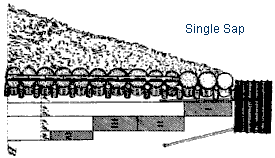 In
siege operations any trench excavated under defensive musket or artillery
fire that was intended to advance a besieging army's position in relation
to the works of the an attacked fortification was referred to as a sap. Saps
of approach were excavated by brigades of trained sappers or instructed troops
of the line who advanced their sap under cover of a sap roller or mantlet
by forming a parapet on the engaged side of the trench one gabion at a time
and filling it with earth taken from the trench. Saps of approach included
single saps with a parapet on one side of the trench, double saps with parapets
on both sides of the trench, and blinded saps with a overhead frame and fascine
shields to protect the sappers from vertical fire. Flying saps were usually
constructed by large working parties of troops of the line under direction
of engineer officers and experienced sappers by placing a large number of
gabions along a pre-designated line and filling them simultaneously with
earth excavated from a trench immediately in rear of the gabions. In
siege operations any trench excavated under defensive musket or artillery
fire that was intended to advance a besieging army's position in relation
to the works of the an attacked fortification was referred to as a sap. Saps
of approach were excavated by brigades of trained sappers or instructed troops
of the line who advanced their sap under cover of a sap roller or mantlet
by forming a parapet on the engaged side of the trench one gabion at a time
and filling it with earth taken from the trench. Saps of approach included
single saps with a parapet on one side of the trench, double saps with parapets
on both sides of the trench, and blinded saps with a overhead frame and fascine
shields to protect the sappers from vertical fire. Flying saps were usually
constructed by large working parties of troops of the line under direction
of engineer officers and experienced sappers by placing a large number of
gabions along a pre-designated line and filling them simultaneously with
earth excavated from a trench immediately in rear of the gabions.
|